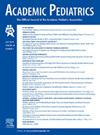Equity in Health Care Access, Utilization, and Experiences for Latino Children in California by Parental Citizenship and Household Language, 2021–22
IF 2.8
3区 医学
Q1 PEDIATRICS
引用次数: 0
Abstract
Objective
This study examines health care access, utilization, and experiences among Latino children in California by parental citizenship and household language.
Methods
Merged data from the 2021–22 California Health Interview Survey and the follow-up Latino Youth Health Study of the same years were analyzed. Primary outcomes were parental reports of children’s health care access, utilization, and experiences in the past year. The main predictors were variables stratified by parental citizenship status (both citizen parents vs 1 citizen and 1 noncitizen parent or both noncitizen parents) and household language (English-only vs English-and-Spanish, or Spanish-only). Multivariable analyses were adjusted for parental education, family income, parent-reported child’s health status, child’s age, and child’s insurance.
Results
Findings showed no significant differences in health care access across groups. However, children with both noncitizen parents and from Spanish-only households were more likely to have had well-child visits and general doctor visits than children with both citizen parents and in English-only households. Additionally, parents of children with both noncitizen parents were more likely to feel respected by doctors than those with both citizen parents. Conversely, compared to parents with both citizen parents, parents of children with 1 citizen and 1 noncitizen parent were less likely to report that doctors spent enough time with their children and less likely to express high satisfaction with their children’s health care.
Conclusions
Patterns of health care access, utilization, and experiences among Latino children in immigrant families in California are improving, which are likely associated with recent inclusive health policies in the state.
根据父母国籍和家庭语言,2021-2022年加州拉丁裔儿童的医疗保健获得、利用和经验的公平性
目的:本研究通过父母国籍和家庭语言考察加州拉丁裔儿童的医疗保健获取、利用和经验。方法:对来自2021-2022年加州健康访谈调查和同年拉丁裔青年健康随访研究的合并数据进行分析。主要结局是父母报告儿童在过去一年中获得、利用和经历的卫生保健。主要的预测因素是根据父母的公民身份(父母双方都是公民,父母一方是公民,父母一方是非公民或父母双方都是非公民)和家庭语言(只讲英语vs只讲英语和西班牙语,或只讲西班牙语)分层的变量。多变量分析调整了父母教育程度、家庭收入、父母报告的儿童健康状况、儿童年龄和儿童保险。结果:研究结果显示各组在卫生保健可及性方面无显著差异。然而,非公民父母和只讲西班牙语家庭的孩子比父母都是公民和只讲英语家庭的孩子更有可能去看健康儿童和普通医生。此外,父母双方都是非公民的孩子的父母比父母双方都是公民的孩子的父母更有可能感到受到医生的尊重。相反,与父母双方都是公民的父母相比,父母一方是公民,另一方是非公民的孩子的父母不太可能报告医生花足够的时间陪伴他们的孩子,也不太可能对孩子的医疗保健表示高度满意。结论:加州移民家庭拉美裔儿童的医疗保健获取、利用和经验模式正在改善,这可能与该州最近的包容性卫生政策有关。
本文章由计算机程序翻译,如有差异,请以英文原文为准。
求助全文
约1分钟内获得全文
求助全文
来源期刊

Academic Pediatrics
PEDIATRICS-
CiteScore
4.60
自引率
12.90%
发文量
300
审稿时长
60 days
期刊介绍:
Academic Pediatrics, the official journal of the Academic Pediatric Association, is a peer-reviewed publication whose purpose is to strengthen the research and educational base of academic general pediatrics. The journal provides leadership in pediatric education, research, patient care and advocacy. Content areas include pediatric education, emergency medicine, injury, abuse, behavioral pediatrics, holistic medicine, child health services and health policy,and the environment. The journal provides an active forum for the presentation of pediatric educational research in diverse settings, involving medical students, residents, fellows, and practicing professionals. The journal also emphasizes important research relating to the quality of child health care, health care policy, and the organization of child health services. It also includes systematic reviews of primary care interventions and important methodologic papers to aid research in child health and education.
 求助内容:
求助内容: 应助结果提醒方式:
应助结果提醒方式:


